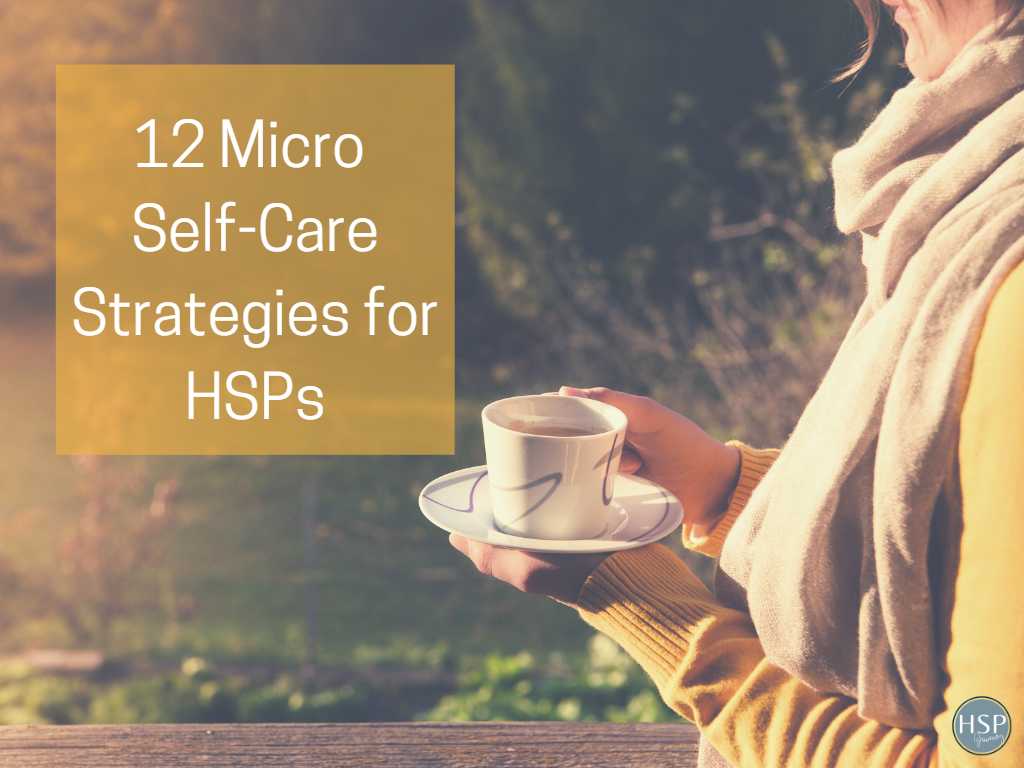Self-care is important for everyone, but it is especially crucial for Highly Sensitive People (HSPs) because they tend to be more easily overwhelmed by their environment and emotions. HSPs have a nervous system that is more sensitive to stimuli, which means they can become overstimulated more easily than others. This can lead to feelings of anxiety, stress, and exhaustion. Instead of waiting for a significant amount of time to devote to self-care, implementing one or more of these 12 micro self-care strategies for HSPs can make self-care easy and attainable.
Small micro acts of self-care can be especially helpful for Highly Sensitive People (HSPs) because they can provide quick relief from overwhelming emotions or sensory input. HSPs can become easily overwhelmed by their environment and emotions, so taking a few minutes to engage in a self-care activity can help them feel more centered and calm. Typically, I build micro self-care strategies into my day during transitions from one project or task to the next. For instance, after a Zoom interview or podcast recording, I take my dog for a short walk to get some fresh air. I also enjoy transitioning from a deep writing project by having a snack or taking a 20-minute power nap.

Table of Contents
Why is self-care important for HSPs?
Engaging in self-care activities can help HSPs manage their sensitivity and prevent burnout. Self-care can include things like getting enough sleep, eating a healthy diet, exercising regularly, and practicing stress-reducing techniques like meditation or yoga. It can also involve setting boundaries, saying “no” to things that don’t serve you, and spending time alone to recharge.
By prioritizing self-care, HSPs can better manage their sensitivity and avoid becoming overwhelmed. This can lead to a greater sense of well-being and a more fulfilling life.
Examples of small micro acts of self-care for HSPs can include:
- Taking a few deep breaths
- Going for a short walk outside
- Listening to calming music
- Drinking a cup of tea
- Taking a quick nap
- Stretching or doing some light yoga
- Writing in a journal
- Taking a few minutes to meditate or practice mindfulness
How does self-care prevent HSP overwhelm?
These activities can help HSPs manage their sensitivity at the moment and prevent feelings of overwhelm from escalating. They can also be done anywhere and at any time, making them easy to incorporate into a busy schedule. By prioritizing small micro acts of self-care, HSPs can take care of themselves and feel more in control of their sensitivity.
Self-care can prevent overwhelm for Highly Sensitive People (HSPs) in several ways:
- Reducing stress: Self-care activities like meditation, yoga, or taking a bath can help reduce stress levels, which can be a trigger for HSP overwhelm.
- Regulating emotions: HSPs can become easily overwhelmed by their emotions, so engaging in self-care activities like journaling or talking to a therapist can help them process their emotions and regulate their mood.
- Setting boundaries: HSPs may feel pressure to say “yes” to everything, but setting boundaries and saying “no” to things that don’t serve them can prevent overwhelm and burnout.
- Taking breaks: HSPs may need more downtime to recharge than others, so taking regular breaks throughout the day or scheduling alone time can prevent overstimulation and overwhelm.
- Boosting mood: Engaging in self-care activities that bring joy, like spending time with loved ones or doing a hobby, can boost mood and prevent feelings of overwhelm.
Overall, self-care can help HSPs manage their sensitivity and prevent overwhelm by reducing stress, regulating emotions, setting boundaries, taking breaks, and boosting mood. By prioritizing self-care, HSPs can feel more in control of their sensitivity and prevent burnout.
And now, I’d like to share 12 simple micro self-care strategies for HSPs:
#1 – Deep Breathing Self-Care Strategies for HSPs
There are quite a number of different breathing exercises that you can use to practice relaxation for a quick few minutes of self-care. Various types of breathing exercises include box breathing, Yoga breathing (through the nose only), equal breathing, and nostril breathing.
There are many different types of breathing exercises that can be helpful for reducing stress, improving focus, and promoting relaxation. Here are a few examples:
- Diaphragmatic breathing: This involves breathing deeply into the belly, rather than shallowly into the chest. To do this, place one hand on your belly and inhale deeply through your nose, feeling your belly expand. Exhale slowly through your mouth, feeling your belly contract.
- Equal breathing: This involves inhaling and exhaling for the same amount of time. To do this, inhale for a count of four, then exhale for a count of four. You can increase or decrease the count as needed.
- Box breathing: This involves inhaling for a count of four, holding for a count of four, exhaling for a count of four, and holding for a count of four before repeating. This creates a “box” shape with your breath.
- Alternate nostril breathing: This involves closing one nostril with your finger and inhaling through the other nostril, then closing that nostril and exhaling through the opposite nostril. Repeat on the other side.
- 4-7-8 breathing: This involves inhaling for a count of four, holding for a count of seven, and exhaling for a count of eight. This can be repeated several times.
These are just a few examples of breathing exercises that can be helpful for managing stress and promoting relaxation. It’s important to find the exercises that work best for you and incorporate them into your self-care routine. Many mindfulness apps have breathing exercises to utilize and can be really helpful as you learn the different breathing techniques.
#2 – Take a 20-Minute Nap
Taking a quick power nap is my personal favorite micro self-care strategy. There are several different ways to nap, depending on your preferences and schedule. Here are a few examples:
- Power nap: A power nap is a short nap, usually around 20-30 minutes, that is designed to provide a quick burst of energy and alertness. This type of nap can be done sitting up or lying down and is best done in the early afternoon.
- Coffee nap: A coffee nap involves drinking a cup of coffee before taking a short nap. The caffeine takes about 20-30 minutes to take effect, so by the time you wake up from your nap, you’ll feel more alert and energized. This type of nap is best done in the morning.
- Nap meditation: A nap meditation involves lying down and focusing on your breath or a guided meditation while you nap. This can help you relax and fall asleep more easily, and wake up feeling refreshed and rejuvenated.
- Hammock nap: A hammock nap involves lying in a hammock and gently swaying back and forth. The gentle motion can be soothing and help you fall asleep more easily.
- Nature nap: A nature nap involves finding a quiet spot in nature, like a park or beach, and taking a nap while surrounded by natural sounds and fresh air. This can be a great way to disconnect from technology and recharge your batteries.
These are just a few examples of different ways to nap. It’s important to find the method that works best for you and fits into your schedule and lifestyle.
#3 – Take a Quick Walk
Take a brisk, five to ten-minute walk around your office or neighborhood to clear your mind and reset for your next task at hand. I find that if I put my sneakers on in the morning and plan to incorporate a walk during my day, I’m much more likely to get out and get some exercise. Also, one of the best ways to stay connected with people is to spend quality time with them, so feel free to incorporate a short walk with a friend into your self-care practice if you need a little face-to-face connection time. If you have a FitBit or other type of wearable watch, you could have it prompt you to get steps throughout the day if this type of notification would be helpful.
#4 – Listen to Calming Music for HSP Self-Care
During a time in my life when I was doing intense trauma-informed therapy, my therapist had me listen to EMDR music on Spotify or Pandora during our sessions to calm my nervous system while we were working through some deep issues. I loved the music so much that I incorporated it into my relaxation strategies. If I need to unwind from a difficult conversation or hard task, I’ll put EMDR music on my noise-canceling headphones to relax. You could also listen to soft piano or guitar music, lo-fi beats, or ocean sounds for a short break.
#5 – Five-Minute Stretch or Light Yoga for HSP Self-Care
If you enjoy stretching or yoga, you could make space on the floor to quickly stretch out your quads, calves, hamstrings, and hips. You could also pop on a short YouTube video that has a quick yoga routine if you can’t think of what moves would be good to do.
#6 – Spend Five Minutes Journaling for HSP Self-Care
Journaling is a wonderful way to process your day and jot down feelings that might be keeping you from deep work. If you’ve had a particularly difficult phone call, or have had an argument with a spouse or family member, taking a few minutes to write down a list of things that are bothering you can help.
Another way to practice journaling is through imperfect journaling. This allows you to be free to admit mistakes and faults, to not worry about how pretty your penmanship is, but to simply document what’s going on inside you. Another option is to use a monthly journaling system like Silk and Sonder. These are beautiful journals mailed to you each month to provide guided journaling and growth.
#7 – Enjoy a Cup of Tea or Coffee (or Your Beverage of Choice)
Some people prefer to drink ice water all day; others like to drink soda or juice. Whether you like hot beverages or cold beverages, having something to drink can be nourishing to the body and soul. While it’s good to watch how much caffeine and sugar you ingest, having a refreshing beverage of your choice can be a wonderful way to take a quick break.
#8 – Listen to a Few Minutes of Your Favorite Podcast
While doing a few moments of housework or other mundane tasks, pop in your earbuds and listen to five to ten minutes of a podcast you like to listen to. When you have other free moments, return to the same podcast to finish listening. While it can take longer to consume the entire podcast, it can provide a needed break.

Looking for an HSP-Trained coach to help you align your life with your priorities?
Through my Highly Sensitive Person (HSP) certification with the Nickerson Institute, as well as being an HSP, I offer HSP coaching to develop specific goals around your HSP needs. We HSPs frequently deal with anxiety and overstimulated nervous systems that prevent us from achieving peace and attaining our life goals. HSP coaching with me includes a detailed review of your sensitivities and a mutually-desired plan for growth and management of this superpower to shift negativity and begin seeing yourself as the hero of your own story. (Affordable monthly coaching begins at $150/month.)
#9 – Call a Friend or Family Member for a Quick Hello
Staying connected to friends and family is important to our mental well-being. Texts are a great way to connect as well, but the phone is often more personal. Call a friend for a short catch-up, even if you have just a few moments, and tell them you care and just wanted to check-in.
#10 – Jot Down an Inspiration Quote or Bible Verse and Read it Throughout the Day
I’m big on trusting your intuition. Sometimes, we have weeks where we have to make big decisions, or we have anxiety about an upcoming event. I find that when I’m feeling overwhelmed by anxiety, focusing on an inspirational quote or Bible verse can help me throughout the day. Combine this with the breathing exercises for a fantastic micro self-care for HSPs moment.
#11 – Practice Gratitude for Micro Self-Care Strategies for HSPs
Pausing to say out loud, journal, or post to social media three things you’re grateful for can be a wonderful way to recenter your attitude on the things that matter to you. If things are not going that well in your life, this practice can encourage you to be mindful of the small things to be grateful for such as warm socks, and a dog who adores you. When things are going well, it’s also wonderful to count your wins and do a little celebrating.
#12 – Enjoy Time to Read for HSP Self-Care
Many introverted HSPs love reading, myself included. While I read before I go to bed each night, taking a few moments to read for a micro-break once or twice during the day feels like ultra-luxury. I find this time to be better for reading self-improvement books than just before bed and reserve my before-bed reading time for fiction or memoirs.
Be sensitive, be free
*This post contains affiliate links and I will be compensated if you make a purchase after clicking on my links*





[…] and even physical exhaustion. That’s why it’s crucial to have a toolbox full of self-care strategies that can help soothe our sensitive […]